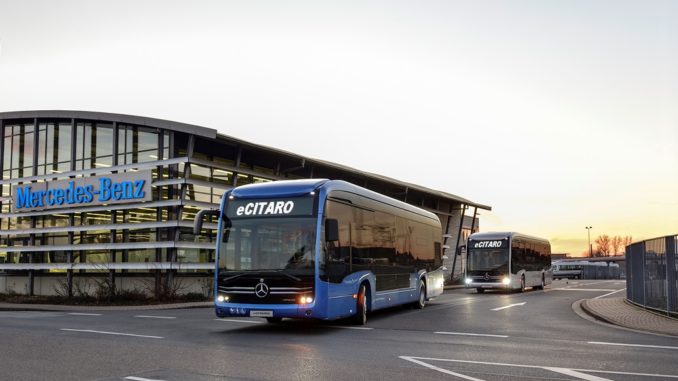
Since several weeks, the first battery-electric driven series Mercedes Benz eCitaro buses have been in operation in public transport in Hamburg and Heidelberg.
More electric buses are to follow in Germany in the coming weeks and Daimler buses received the first orders from neighbouring European countries.
At Daimler Buses, production of the eCitaro is at series level and the bus plant in Mannheim can deliver. All in all, there is not yet a universal demand for electric buses from the public transport companies. This might be because switching a conventional bus fleet to electric drive and ensuring the necessary infrastructure can be more complex than planned.
Transport operators in Europe test the eCitaro’s suitability for daily use
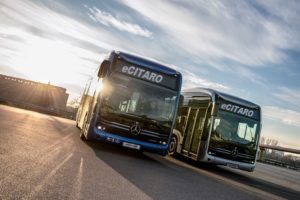 At the same time as the deliveries in Germany, in a few days several eCitaro buses will be driving to locations and contract partners of Daimler Buses in Luxembourg, France and Poland. Once there, they will be integrated into local bus operations to convince those responsible for local public transport of their qualities and suitability for everyday use.
At the same time as the deliveries in Germany, in a few days several eCitaro buses will be driving to locations and contract partners of Daimler Buses in Luxembourg, France and Poland. Once there, they will be integrated into local bus operations to convince those responsible for local public transport of their qualities and suitability for everyday use.
The advantages of electric buses: They do not emit pollutants locally and make almost no noise. These are aspects which are currently of great importance to the development of clean air planning in many cities and regions. On the other hand it requires a lot of time and money for transport operators to change to electric buses and the necessary infrastructure.
The technology of an electric bus alone is very expensive and the infrastructure must be designed to fit the local situation and requirements, for example charging stations, workshop equipment, qualification of personnel etc. Therefore Daimler Buses – one of the most experienced and strongest partners of bus operators – supports transport operators with its eMobility Consulting and Omniplus by offering individual advice, services and training to companies making the change. One of the most important stipulations necessary to Daimler Buses entering the market for electric buses was to be able to offer a vehicle which satisfies transport operators in every way just like the well-established Citaro has done a thousand times over. The electric bus must combine operating safety, availability in the daily routine and the driving safety of a series-production vehicle with the new requirements for emissions.
Highly developed technology as the basis for maximum efficiency
The Mercedes-Benz eCitaro is not produced in a prototype workshop but on the same production line as all of the other city buses in the plant in Mannheim and has thus achieved production standard. The distinction lies first and foremost in the drive technology. The eCitaro buses that will be available for testing 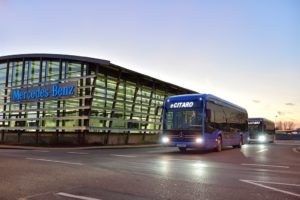 in European cities are equipped with ten battery packages and a total capacity of 243 kWh as well as electric motors mounted close to the wheel hubs. The thermal management optimised to the very last detail with battery cooling, air conditioning with a heat pump and connected components is a highlight in the world of bus construction. These features ensure minimum energy consumption and in turn the highest efficiency and maximum range. The fact that the power consumption of an electric bus for heating and cooling can be as much as 50 percent is a challenge that in the main only bus specialists are aware of. The complex chassis of electric buses is characterised by the Electronic Stability Program (ESP) as well as roll and pitch control, for example. Safety, efficiency and environmental conservation are all integral to the Mercedes-Benz eCitaro.
in European cities are equipped with ten battery packages and a total capacity of 243 kWh as well as electric motors mounted close to the wheel hubs. The thermal management optimised to the very last detail with battery cooling, air conditioning with a heat pump and connected components is a highlight in the world of bus construction. These features ensure minimum energy consumption and in turn the highest efficiency and maximum range. The fact that the power consumption of an electric bus for heating and cooling can be as much as 50 percent is a challenge that in the main only bus specialists are aware of. The complex chassis of electric buses is characterised by the Electronic Stability Program (ESP) as well as roll and pitch control, for example. Safety, efficiency and environmental conservation are all integral to the Mercedes-Benz eCitaro.
Source: Daimler AG

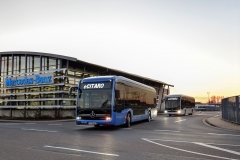
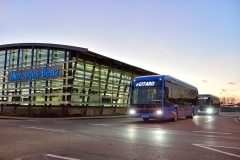
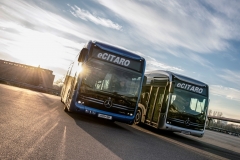
Be the first to comment